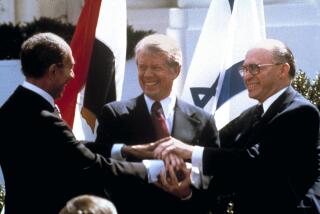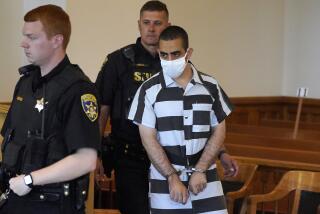Standoff Over Chemical Weapons Pact
- Share via
WASHINGTON — Marshaling impressive legions of dueling experts, President Clinton and Sen. Jesse Helms (R-N.C.) faced off Friday in a high-stakes debate over the international chemical weapons treaty, with each side predicting national catastrophe if the other side wins.
Clinton struck first, assembling in the White House Rose Garden a group of treaty supporters, including such Republicans as former Secretary of State James A. Baker III and retired Gen. Colin L. Powell, to call for prompt Senate ratification of the pact.
The treaty would ban the use, manufacture, sale and possession of poison gas and other chemical armaments.
Helms, chairman of the Senate Foreign Relations Committee, where the treaty has languished for more than three years, responded by announcing his own plan to showcase such prominent treaty opponents as former Defense Secretaries Caspar W. Weinberger, Donald H. Rumsfeld and James R. Schlesinger in a series of hearings scheduled to begin Tuesday.
Although Helms sounded conciliatory during a visit by Secretary of State Madeleine Albright to North Carolina last month, he made clear Friday that he has not softened his opposition to the treaty. Helms has said that the treaty is so flawed it would not restrict the chemical weapons programs of rogue nations but would impose dangerous restrictions on the United States.
Because much of the debate involves mind-numbing technicalities, Clinton and Helms are focusing on the political equivalent of celebrity endorsements. Joining Clinton, Baker and Powell in the Rose Garden on Friday were longtime arms-control negotiator Paul H. Nitze and the administration’s first team of Albright, Defense Secretary William S. Cohen and Gen. John M. Shalikashvili, chairman of the Joint Chiefs of Staff.
The White House also released a letter supporting the pact signed by 17 retired four-star generals and admirals.
Helms shot back with a written statement: “I watched today’s White House ceremony with great interest. I hope the president will be kind enough to lend me the Rose Garden next week to introduce my team.”
*
Of course, Helms does not need the Rose Garden; he has the Senate Foreign Relations Committee hearing room, where he plans to parade treaty critics.
“To date,” he said, “more than 50 generals, admirals and senior foreign policy leaders have come out in opposition to the treaty.”
The treaty, already ratified by 70 of the 161 countries that signed it, cannot be altered now and will take effect April 29 whether the United States ratifies it or not. Yet Helms has demanded assurances from the administration on such issues as interpretation of treaty provisions and conditions under which the United States would withdraw from the pact.
Of 30 points of disagreement at the start of the talks, sources on both sides say that between 17 and 21 have been settled. But negotiations have bogged down on the rest, and on Friday Helms accused the administration of stonewalling.
The White House said that, if the Senate does not approve the treaty by April 29, U.S. chemical companies will be subjected to international sanctions and the United States will be denied a seat on the commission that monitors treaty compliance, even if Washington later approves it.
Helms and his supporters contended that White House concern about the deadline is exaggerated and that they will continue discussing the unresolved issues next month if no agreement has been reached by then.
The pact is unlikely to come before the full Senate, where ratification requires a two-thirds majority vote, before mid-April, said Susan Irby, press secretary to Senate Majority Leader Trent Lott (R-Miss.).
Republicans are seeking assurances from the administration and Senate Democrats that they will not try to block GOP legislation designed to fill in what Republicans believe are gaps in the treaty.
Times staff writer Janet Hook contributed to this report.
More to Read
Get the L.A. Times Politics newsletter
Deeply reported insights into legislation, politics and policy from Sacramento, Washington and beyond. In your inbox twice per week.
You may occasionally receive promotional content from the Los Angeles Times.










